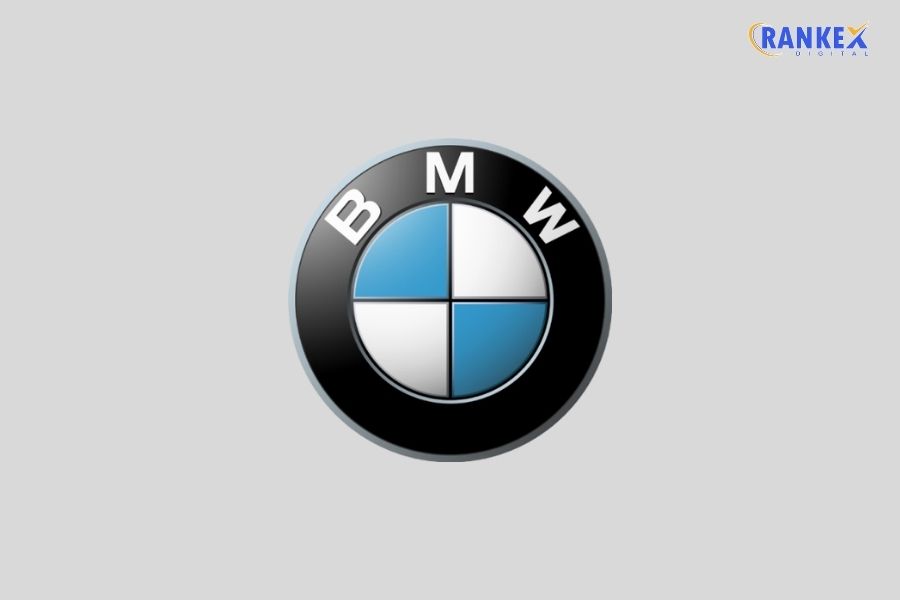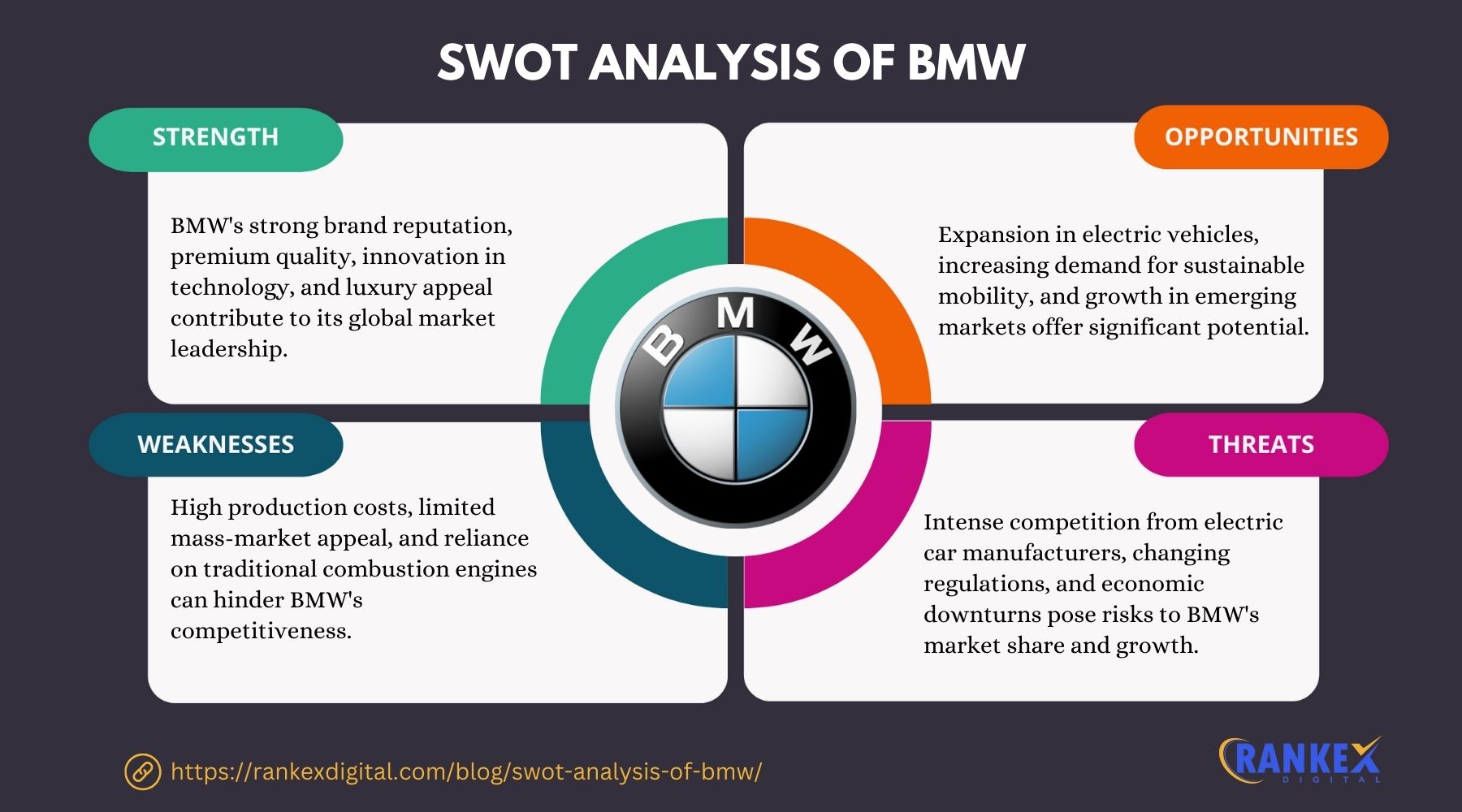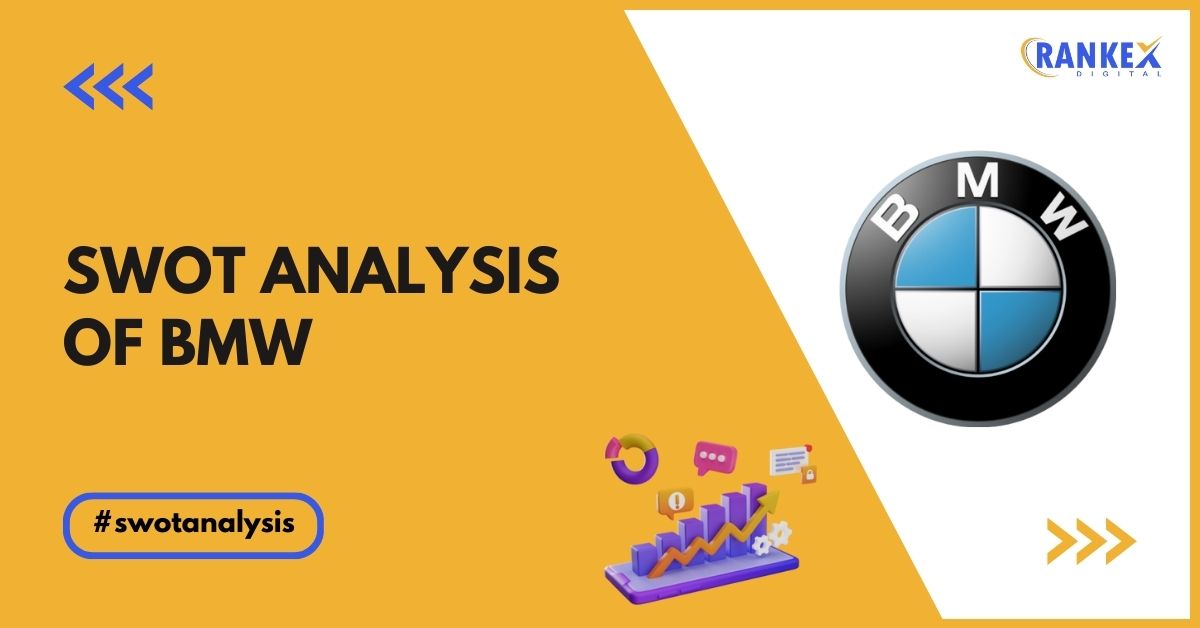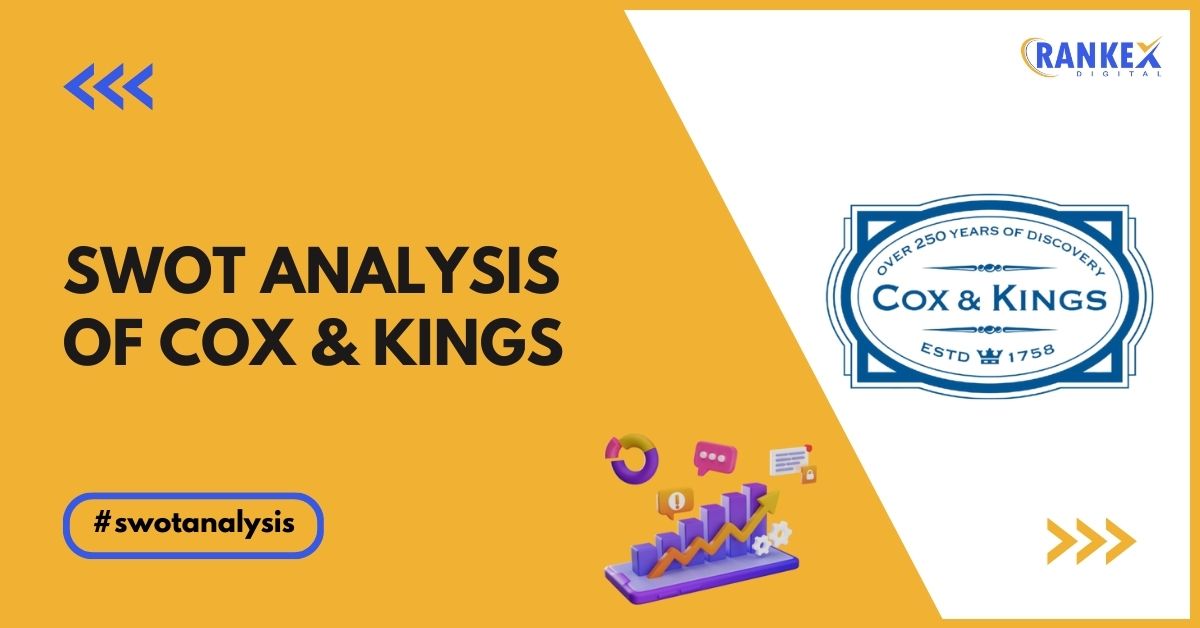BMW, a name synonymous with luxury, performance, and engineering excellence, has solidified itself as a leading global player in the automotive industry. Known for its high-quality vehicles, cutting-edge technology, and exceptional driving experience, BMW continues to innovate and capture the hearts of car enthusiasts worldwide.
Conducting a SWOT analysis of BMW is essential to understanding the company’s current position and its strategic direction for future growth. In this blog, we delve into BMW’s strengths, weaknesses, opportunities, and threats, offering a comprehensive look at the company’s performance and potential in an increasingly competitive market.
In this blog
Overview of BMW

Founded in 1916, BMW (Bayerische Motoren Werke AG) is a German multinational company that produces luxury automobiles and motorcycles.
With a focus on high performance and innovative design, BMW is renowned for its premium vehicles that combine superior engineering, technology, and performance.
Headquartered in Munich, Germany, the company operates globally, with a wide range of vehicles under its three main brands: BMW, MINI, and Rolls-Royce.
Quick Stats About BMW
| Attribute | Details |
|---|---|
| Founder | Franz Josef Popp, Camillo Castiglioni, and Karl Rapp |
| Year Founded | 1916 |
| Headquarters | Munich, Germany |
| Employees | 130,000+ |
| CEO | Oliver Zipse |
| Revenue (2023) | €116 Billion |
| Net Income (2023) | €7.5 Billion |
SWOT Analysis of BMW

Strengths of BMW:
Strong Brand Reputation:
BMW’s reputation as a symbol of luxury, performance, and precision engineering is one of its most significant strengths. The brand has consistently been associated with high-quality vehicles, exceptional driving experiences, and a focus on craftsmanship. This reputation allows BMW to command a premium price for its vehicles, ensuring a loyal customer base of high-income and performance-oriented buyers. Moreover, BMW’s strong brand presence is reinforced through consistent marketing campaigns and sponsorships of major sporting events, further enhancing its image as a leader in the automotive industry.
Innovative Technology:
BMW has long been at the forefront of integrating advanced technologies into its vehicles. The introduction of the iDrive system revolutionized in-car interfaces, allowing for easier control of entertainment, navigation, and communication functions. In addition to the iDrive, BMW has developed cutting-edge driver assistance systems (ADAS) that enhance safety and convenience, such as adaptive cruise control, lane-keeping assist, and autonomous parking. The company is also a leader in electric mobility with its electric vehicles (EVs), including the BMW i3 and i8, and the company continues to push the boundaries with the development of hydrogen fuel cell technology and EV infrastructure.
Diverse Product Portfolio:
BMW’s ability to cater to a wide range of customers with a diverse portfolio is a major strength. From the sporty and luxurious BMW 3 Series to the more practical X5 SUV, BMW has options across various vehicle categories. The company also operates several sub-brands that serve different customer segments, including MINI for compact cars and Rolls-Royce for ultra-luxury vehicles. This breadth of offerings allows BMW to maintain its presence across markets worldwide and ensures the company can appeal to both premium buyers and those seeking entry-level luxury vehicles.
Sustainability Initiatives:
BMW has consistently prioritized sustainability, setting ambitious goals to reduce its carbon footprint and promote environmentally friendly practices. The company has increased its investment in electric and hybrid vehicles, launching several new models like the fully-electric BMW i4 and the BMW iX. Furthermore, BMW’s commitment to sustainability extends to its manufacturing processes, where it has adopted energy-efficient technologies, reduced water consumption, and incorporated recyclable materials into vehicle production. BMW’s sustainable initiatives appeal to environmentally-conscious consumers who want to drive a vehicle that aligns with their values.
Global Presence:
BMW’s robust global footprint is another key strength. Operating in over 140 countries, BMW has a wide-reaching distribution and service network that supports its sales and service operations. The company has established a significant presence in key markets like North America, Europe, and Asia, allowing it to navigate regional economic fluctuations effectively. BMW’s global manufacturing footprint, with production facilities in Europe, North America, and China, further strengthens its ability to meet demand across different regions while minimizing risks associated with supply chain disruptions.
Weaknesses of BMW:
High Production Costs:
The focus on premium vehicles equipped with advanced technology and top-tier materials leads to higher production costs for BMW. This cost structure makes it challenging to compete in the mass-market segment, where companies like Toyota and Volkswagen can leverage economies of scale to offer more affordable vehicles. The high production costs could also be a risk if economic conditions change and consumers turn away from luxury goods in favour of more budget-friendly alternatives.
Reliance on the European Market:
While BMW has a strong global presence, it remains highly reliant on the European market for a significant portion of its revenue. As a result, changes in the European economy or shifts in consumer behaviour, such as a move away from premium cars or a decline in economic stability, can have a disproportionate effect on the company’s overall performance. BMW’s reliance on Europe also exposes the company to the risks associated with political instability, such as the implications of Brexit.
Complex Product Range:
Although the diversity of BMW’s product lineup is a strength, it also presents challenges in terms of operational efficiency. A broad range of models, configurations, and technology options increases the complexity of production and supply chain management. It also raises the risk of potential delays or quality control issues, as different models require varying components and different levels of customization. Managing this complexity can strain resources and increase the potential for mistakes or miscommunications.
Limited Electric Vehicle Lineup:
While BMW has made notable strides with its electric vehicle lineup, it still trails behind competitors like Tesla in terms of volume and variety. Although BMW offers a few electric models, such as the i3 and i4, its electric vehicle portfolio is not as expansive as some of its competitors. This could limit BMW’s ability to meet the growing consumer demand for electric vehicles and hampers its competitiveness in an increasingly important market segment. The company will need to accelerate its electric vehicle production and innovation to maintain relevance in this rapidly expanding sector.
Quality Control Issues:
BMW has faced periodic quality control challenges, including recalls and reliability issues that have tarnished its reputation for engineering excellence. Instances of faulty parts, electrical malfunctions, and even safety concerns have led to some negative press for the brand. Given the company’s premium positioning, quality issues can have a significant impact on consumer trust and brand loyalty. BMW must ensure stringent quality control measures to maintain its image as a maker of reliable, high-performance vehicles.
Opportunities for BMW:
Expansion of Electric Vehicle Portfolio:
As the global automotive industry shifts towards electrification, BMW has a significant opportunity to expand its electric vehicle offerings. The increasing adoption of electric vehicles (EVs) and government incentives for sustainable transportation create a favorable environment for BMW to introduce new models and increase market share. Additionally, investing in EV infrastructure, such as charging stations, could further strengthen the brand’s position in the growing EV market.
Growth in Emerging Markets:
The growing middle-class populations in emerging markets like China, India, and Africa present a tremendous opportunity for BMW. As disposable incomes rise, there is increased demand for premium goods, including luxury cars. By introducing models tailored to the tastes and budgets of consumers in these regions, BMW can tap into a new customer base. Offering more affordable luxury options, possibly leveraging MINI or introducing entry-level models under the BMW brand, could further strengthen the company’s presence in these developing markets.
Autonomous Driving Technology:
BMW has an opportunity to invest in autonomous driving technology, positioning itself as a leader in this emerging market. As autonomous driving becomes more mainstream, the company could capitalize on this trend by integrating cutting-edge self-driving features into its vehicles. By partnering with tech companies and investing in R&D, BMW can stay ahead of competitors in this transformative area of the automotive industry, potentially creating new revenue streams and business models centred around autonomous transportation.
Sustainability Leadership:
With increasing consumer interest in sustainability, BMW has an opportunity to further enhance its reputation by taking a leadership role in the eco-friendly automotive space. Expanding its range of electric, hybrid, and low-emission vehicles could appeal to environmentally-conscious consumers. Additionally, BMW could continue to innovate in sustainable production processes, such as using more recyclable materials in manufacturing or developing carbon-neutral manufacturing plants.
Partnerships and Collaborations:
Strategic partnerships with technology companies could help BMW accelerate innovation and maintain its competitive edge. Collaborations in areas such as battery technology, artificial intelligence, and autonomous driving could help BMW enhance its vehicles’ technological capabilities. By leveraging external expertise, BMW can stay ahead of industry trends and create a more future-proof product lineup.
Threats to BMW:
Intense Competition:
BMW operates in an incredibly competitive market, facing strong rivals like Mercedes-Benz, Audi, and Lexus in the luxury vehicle segment. Furthermore, new entrants like Tesla, with its focus on electric vehicles and cutting-edge technology, present a serious threat. To maintain market share, BMW must continually innovate and differentiate its offerings to stand out in an increasingly crowded automotive market.
Economic Downturns:
As a premium brand, BMW’s sales are more vulnerable to economic downturns compared to mass-market automakers. During recessions or financial crises, consumer spending on luxury goods tends to decrease, leading to reduced demand for high-end vehicles. This makes BMW’s revenue more susceptible to economic instability, particularly in key markets such as Europe and North America, where demand for luxury goods can fluctuate based on economic conditions.
Regulatory Challenges:
Stringent environmental regulations, especially in the European Union, pose a significant challenge for automakers like BMW. These regulations, which include strict emissions standards and carbon footprint reduction targets, force BMW to invest heavily in new technologies, such as electric drivetrains and alternative fuel systems. Compliance with these regulations requires significant investment in research and development, which could affect profit margins and hinder flexibility in vehicle design.
Geopolitical Risks:
Geopolitical risks, such as trade wars, tariffs, and political instability, pose a threat to BMW’s global operations. For example, ongoing trade tensions between the US and China could disrupt BMW’s supply chain or increase costs. Additionally, political instability or changes in government policies in key markets could affect BMW’s ability to sell and produce vehicles at competitive prices, thus impacting its profitability.
Technological Disruptions:
The pace of technological innovation in the automotive industry is rapidly accelerating. Autonomous driving, artificial intelligence, and electric vehicle technology are transforming the way vehicles are designed and used. If BMW fails to keep pace with these innovations or fails to adopt new technologies swiftly, it risks losing its competitive edge. Failure to adapt to these disruptions could result in the company being outpaced by more technologically advanced competitors.
Frequently Asked Questions
What is BMW’s biggest strength?
BMW’s biggest strength is its strong brand reputation for luxury, performance, and engineering excellence, which has built a loyal customer base globally.
How does BMW handle competition from other automakers?
BMW stays competitive by continuously innovating, maintaining a diverse product range, and focusing on high-quality, high-performance vehicles that appeal to luxury car buyers.
What are BMW’s sustainability initiatives?
BMW is committed to sustainability by producing electric and hybrid vehicles, reducing carbon emissions, and utilizing recyclable materials in its manufacturing process.
How is BMW addressing the rise of electric vehicles?
BMW is expanding its electric vehicle lineup with models like the i3, i4, and iX3, and investing in the development of electric mobility solutions to meet the growing global demand for EVs.
What challenges does BMW face in the future?
BMW faces challenges such as intense competition, regulatory hurdles, the need to accelerate its electric vehicle strategy, and the impact of global economic instability on luxury car sales.
Conclusion
BMW’s SWOT analysis showcases its position as a leader in the automotive industry, with significant strengths in brand recognition, technology, and innovation. However, the company must navigate challenges like intense competition, economic fluctuations, and the rapid shift toward electric vehicles.
By leveraging its strengths and capitalizing on emerging opportunities, BMW can continue to thrive in the luxury automotive market for years to come.











